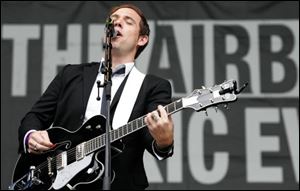
Mikel Jollett finding his voice with Airborne Toxic Event
12/5/2011
Once an aspiring novelist, Mikel Jollett of the Airborne Toxic Event didn’t start writing songs until he was 31.
Mikel Jollett was born in a commune and raised by hippie parents who moved around California in a Volkswagen van.
He aspired to be a novelist but found his niche writing music at age 31, relatively over the hill for a budding rock star.
Now 37, Jollett is the frontman for the Airborne Toxic Event, a Los Angeles indie rock band. The five-piece group is fresh off the release of second album “All at Once,” a bold, emotional collection of songs steeped in politics and life’s big questions.
During a recent interview, Jollett spoke about his disgust for war, his painstaking writing process and the story behind the band’s unusual name.
Q: You created some buzz recently when you ran into the Gulf of Mexico at DeLuna Fest in Pensacola, Fla. What were you thinking?
A: It was one of those rock and roll moments. We were on this big stage and I was climbing on the rafters. It was sunset on the beach and it was just beautiful. I went to the crowd and was like, ‘Wow, I kind of want to jump in the ocean,’ and the whole crowd went, ‘YEEAAHH!’ I climbed off the rafters and threw the mike down, and about 20 of us jumped into the water in the middle of a song. The band just kept playing. It was so cool. It was such a metaphor for what rock and roll is about, that unbridled energy, reckless youth, and abandon.
Q: What prompted you to start songwriting?
A: I was alone a lot working on a novel and I had a guitar. I was in this tiny studio on the east side of L.A. The kitchen was literally two feet from the bathroom, which was a foot from the bedroom. I was really broke and had like $12 to my name at one point. I was hungry. I kind of got bored writing the novel and started writing songs. There was a restlessness to it at the time. I remember feeling like I should be out singing songs, performing. I wrote Wishing Well first (in 2006).
Q: I see that the name Airborne Toxic Event was inspired by White Noise by Don DeLillo. What’s the reference?
A: There’s three units in the book and the second one is called the Airborne Toxic Event. It’s a big chemical cloud created by an explosion at a factory and the cloud covers the city and everybody has to get their family and run away. The protagonist gets exposed to it and the doctors tell him he’s going to die. He said, ‘How long do I have to live? Well, you might die tomorrow, it might be 50 years, which is really true for anyone. The reality of it changes how he goes about his life.
Q: How would you describe your writing process?
A: It’s more like a sculpture where you start with the basic framework of an idea, then get into the details as you go. You keep sculpting and paring it down. What am I seeing? What am I trying to say? How do these ideas fit together and how do they fit with the music? It’s about going over it again and again and again. It’s exhausting.
Q: A lot of your songs have religious references. Where do those come from?
A: Probably like most people, I spend a lot of time thinking about God and what God means and trying to confront these questions. Being a songwriter really forces you to confront questions. Your job is to wrestle with them and think about them thoroughly ?and come up with some kind of answers.
Q: A song off your new album, “Welcome to Your Wedding Day,” talks about a U.S. bombing of a wedding party in Afghanistan in 2008. How do politics influence your music?
A: I was (ticked) off about the war and the march to war. The song is about ? what the U.S. intervention and ideology gave to this Afghani family. I think it’s important to point out that I’m sure this was horrific for the people who were on the American side. It must be a very, very difficult thing to have to live with. But that’s the point of war. No one escapes — the perpetrators, the victims, the bystanders. Everyone is tainted by it. The march to war is the most irresponsible, ridiculous thing our country can do, other than as a last resort.
Q: What can fans expect at a show?
A: We always like to say rock and roll happens to you. It doesn’t happen in front of you. That’s how we approach shows. It’s like the audience and us are looking at something else. We’re experiencing these ideas and emotions together.